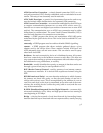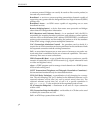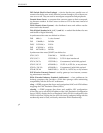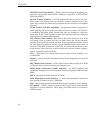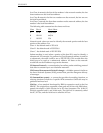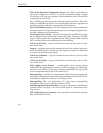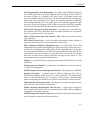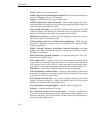
g-11
GLOSSARY
ISDN (Integrated Services Digital Network) - an emerging technology that
is beginning to be offered by the telephone carriers of the world. ISDN com-
bines voice and digital network services into a single medium or wire.
ISO (International Standards Organization) - a voluntary, non treaty organi-
zation founded in 1946 that is responsible for creating international standards
in many areas, including computers and communications.
Isochronous - signals carrying embedded timing information or signals that
are dependent on uniform timing; usually associated with voice and/or video
transmission.
Jumper - a patch cable or wire used to establish a circuit, often temporarily,
for testing or diagnostics; also, the devices, shorting blocks, used to connect
adjacent exposed pins on a printed circuit board that control the functionality
of the card.
LAN (Local Area Network) - a data network intended to serve an area of only
a few square kilometers or less. Because the network is known to cover only a
small area, optimizations can be made in the network signal protocols that
permit higher data rates.
lane - a program that provides control over the execution of the LAN Emula-
tion Server (LES), Broadcast/Unknown Server (BUS), and LAN Emulation
Configuration Server (LECS) on the local host.
LAN Access Concentrator - a LAN access device that allows a shared trans-
mission medium to accommodate more data sources than there are channels
currently available within the transmission medium.
Layer Entity - an active layer within an element.
Layer Function - a part of the activity of the layer entities.
Layer Service - a capability of a layer and the layers beneath it that is pro-
vided to the upper layer entities at the boundary between that layer and the
next higher layer.
Layer User Data - the information transferred between corresponding entities
on behalf of the upper layer or layer management entities for which they are
providing services.
le - a FORE program that implements both the LAN Emulation Server (LES)
and the Broadcast/Unknown Server (BUS).
LEC (LAN Emulation Client) - the component in an end system that per-
forms data forwarding, address resolution, and other control functions when
communicating with other components within an ELAN.
lecs - a FORE program that implements the assignment of individual LECs to
different emulated LANs.



